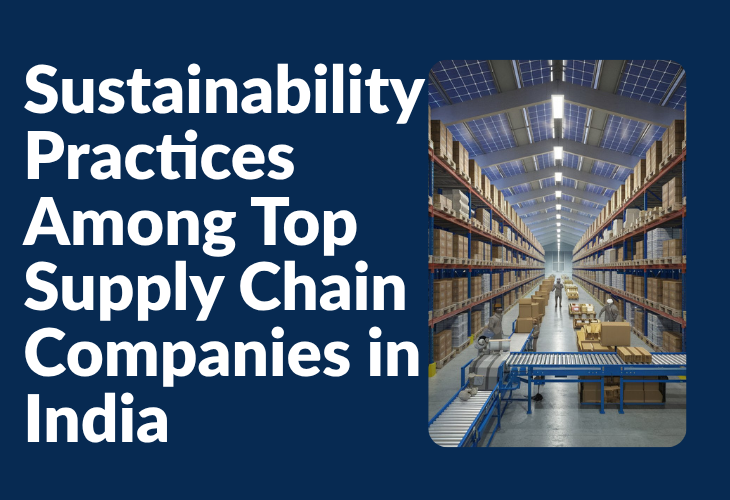Sustainability Practices Among Top Supply Chain Companies in India
Introduction: A Green Revolution in Indian Supply Chains
Imagine a sprawling warehouse in Mumbai, once humming with conventional diesel trucks and energy-intensive operations. Today, solar panels glint atop its roof, delivery vans are increasingly electric, and every process is carefully tracked to reduce carbon emissions. This isn’t a futuristic dream—it’s the reality for leading supply chains in India. Green supply chain India initiatives are transforming the way companies source, store, and transport goods, making sustainability a strategic necessity rather than a mere trend.
Businesses across sectors are recognizing that adopting eco-friendly operations not only enhances brand credibility but also reduces operational costs. As consumer consciousness grows and environmental regulations tighten, sustainable logistics companies India are becoming the backbone of modern commerce.
The Growing Importance of Sustainability in Supply Chains
The supply chain landscape in India has been rapidly evolving. Traditional models focused on cost and speed, often overlooking environmental impact. Now, companies are prioritizing sustainability alongside efficiency, driven by global expectations and local incentives.
Recent industry insights show that the Indian supply chain industry trends favor energy efficiency, waste reduction, and circular supply chains. More companies are adopting practices that reduce carbon emissions, optimize resource use, and minimize waste. For instance, firms integrating energy-efficient warehouses and digital route optimization have reported up to 20% reduction in fuel costs while significantly cutting their carbon footprint.
Mini Story: A leading FMCG company in Bengaluru replaced diesel delivery trucks with electric vehicles for urban routes. Not only did this reduce emissions, but it also increased delivery reliability due to lower maintenance downtime—a perfect example of a smart supply chain in action.
Dissecting Sustainability Practices Among Top Supply Chain Companies in India
This section dives deep into the actual sustainability practices among top supply chain companies in India, highlighting actionable insights and measurable outcomes.
1. Energy Efficiency & Carbon Footprint Reduction
Top supply chain companies in India are reimagining energy usage. Warehouses are adopting LED lighting, solar panels, and energy management systems. Vehicle fleets are being optimized through electric and hybrid options, GPS-enabled route planning, and telematics that track fuel consumption.
- Fact: A major Indian logistics company reported a 15% year-on-year reduction in greenhouse gas emissions after integrating hybrid trucks and energy-efficient warehouse systems.
These steps aren’t just environmentally responsible—they lower operational costs, making the supply chain solution more robust and future-ready.
2. Waste Management & Circular Supply Chains
Sustainability isn’t only about energy—it’s about materials too. Companies are implementing recycling programs, reusable packaging, and minimalistic material usage. Circular supply chains are gaining traction, where materials at the end of their lifecycle are reused or repurposed.
Mini Story: An apparel logistics firm in Tirupur started using biodegradable packing materials for exports. This initiative decreased landfill waste and attracted international clients focused on ethical sourcing—reinforcing the importance of an eco-friendly supply chain India.
3. Smart Logistics & Technology Integration
Modern supply chains increasingly rely on IoT, AI, and cloud-based platforms to track inventory, predict demand, and optimize delivery routes. This technology enables smarter decision-making with less environmental impact.
- Fact: AI-driven route optimization can reduce fuel consumption by up to 12%, highlighting the advantages of adopting a smart supply chain approach.
By integrating technology, companies create sustainable logistics companies India that are efficient, reliable, and environmentally responsible.
4. Ethical Sourcing & Supplier Standards
Sustainability also extends to sourcing. Leading companies enforce strict supplier standards, ensuring that raw materials are responsibly sourced. Certifications, audits, and compliance checks are now standard in the supply chain ecosystem.
Mini Story: A metal supply chain company in Gujarat sources only from certified mines adhering to eco-friendly extraction practices. This strengthens trust with international buyers seeking responsible supply chain companies.
5. Impact Measurement & Reporting
Finally, top companies measure and report sustainability impacts. ESG (Environmental, Social, Governance) reporting is now common, providing transparency to stakeholders and enabling continuous improvement.
- Fact: Indian supply chains reporting ESG metrics have seen a 10-18% improvement in investor confidence and client retention, underscoring the commercial value of an eco-conscious supply chain solution.
Recent Trends & Insights
Sustainability in Indian supply chains isn’t static—it’s evolving rapidly. Some notable trends include:
- Green Warehousing: Warehouses powered by solar and equipped with energy-efficient systems are becoming standard.
- Digital Logistics Platforms: Real-time tracking and AI-driven planning reduce emissions and enhance efficiency.
- Eco-Packaging Innovation: Biodegradable, recyclable, and minimal packaging is increasingly used for both domestic and international sourcing.
- Collaboration & Shared Logistics: Companies are pooling transport resources to reduce redundancy and emissions.
Interesting Facts:
- India’s sustainable logistics market is projected to grow at a CAGR of ~15% over the next five years.
- Circular supply chain initiatives can reduce operational costs by up to 10% while improving environmental outcomes.
- Smart supply chain technology adoption has increased by 30% in Indian companies in the last two years.
Case Study: Leading Indian Supply Chains in Action
Consider a top-tier Indian logistics company managing international sourcing for electronics. By adopting hybrid transport fleets, AI route optimization, and eco-friendly warehouses, the company reduced its carbon footprint by nearly 18% in one year while maintaining faster delivery timelines.
Similarly, a food supply chain company integrated biodegradable packaging and rigorous supplier sustainability audits. The result? Reduced waste, stronger client trust, and higher compliance with export regulations in Europe and the Middle East.
These examples illustrate that sustainable practices are both profitable and responsible, shaping the future of eco-friendly supply chain India models.
Closing Thoughts: The Path to Sustainable Success
Sustainability in supply chains is no longer a peripheral goal—it’s at the heart of modern business strategy. Indian companies are proving that eco-friendly supply chain India models can deliver efficiency, cost savings, and brand reputation simultaneously.
For businesses looking for a supply chain solution that is reliable, agile, and environmentally conscious, Vertez Steel Global offers a proven path forward. By leveraging agile sourcing, transparent dealings, and seamless logistics, they help businesses integrate smart supply chain practices into their operations. Their approach demonstrates how international sourcing, diversified product handling, and a focus on sustainability can be harmonized into a practical, scalable model.
Incorporating green supply chain India, ethical practices, and technology-driven optimization, Vertez Steel Global represents a model of modern, responsible logistics—proving that efficiency, profitability, and sustainability can coexist.
Ultimately, adopting these practices doesn’t just future-proof your supply chain—it positions your business as a leader in global supply chain industry trends, setting the standard for other supply chain companies to follow.



